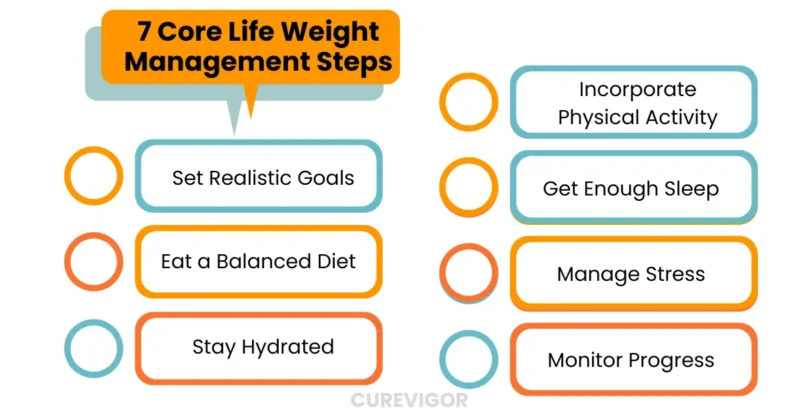Master Core Life Weight Management by adopting 7 sustainable steps. Discover clear, proven practices to achieve a healthier, balanced lifestyle focused on long-term wellness.
Thank you for reading this post, don't forget to subscribe!You will remember
- Sustainable weight management is about habits, not quick fixes.
- Balanced nutrition, activity, sleep, and stress management are key pillars.
- Small, realistic changes lead to long-term health and confidence.
How to Master Core Life Weight Management with Simple, Healthy, and Sustainable Habits
Weight management is more than numbers on a scale—it’s about energy, balance, and confidence. Many pursue crash diets or extreme workouts but end up frustrated. Core Life Weight Management builds healthy, sustainable habits that fit your lifestyle for long-term success.
Achieving a healthy weight does not require deprivation or unrealistic expectations. Make incremental changes, eat well-balanced meals, and maintain an active lifestyle.
These deliberate, regular actions assist you in developing a way of life that promotes both your mental and physical health. Here’s how.

Understanding Core Life Weight Management
A. What is a Healthy Weight Range?
Before diving into action steps, it’s important to know what a “healthy weight” means for you. It isn’t about copying someone else’s body type or following a one-size-fits-all chart.
Although it is not ideal, doctors frequently utilize body mass index, or BMI, as a reference. Age, bone structure, and muscle mass are other important factors. A healthy weight should leave you feeling energetic, reduce the risk of chronic illness, and support daily activities without strain.
Instead of obsessing over numbers, think of it as finding the weight where your body feels strong, light, and in balance. Also, it’s important to acknowledge individual differences.
If you have a medical condition or unique needs, consulting a healthcare provider can help tailor advice to your situation.
B. Key Factors That Influence Weight
Diet and Nutrition
Your food choices affect how your body stores or burns energy. Diets high in sugar, fried foods, and processed snacks cause weight gain and sluggishness.
Instead of rigid meal plans, choose nutrient-dense foods—whole grains, vegetables, lean proteins, nuts, and seeds—for fuel without empty calories.
Physical Activity
Movement is essential. Physical activity burns calories, boosts metabolism, strengthens muscles, improves mood, and regulates hormones. Even brisk 30-minute walks can make a difference.
Lifestyle Factors: Stress and Sleep
Stress and sleep have a big impact: stress can trigger overeating and belly fat, and poor sleep leads to cravings. Core Life Weight Management addresses these by helping manage stress and improve sleep, which are key to lasting results.
7 Core Life Weight Management Habits for a Healthier, Balanced You

1: Set Realistic Goals
One of the biggest mistakes in weight management is setting goals that are too ambitious. Wanting to lose 20 pounds in two weeks is a recipe for disappointment. Instead, aim for small, realistic targets.
Try losing 1–2 pounds per week or committing to exercise three times a week. It’s important to remember that setbacks are a normal part of the journey.
When progress stalls, it can be helpful to revisit your initial goals and make adjustments, if necessary. Regain motivation by celebrating small successes and reminding yourself of the reasons you started this journey.
Write down your goals, and pair them with a timeline. A clear, achievable roadmap keeps you motivated and helps prevent burnout. Every small win adds up to long-term success.
2: Eat a Balanced Diet
Forget fad diets. Balance is key. A balanced diet provides the right proportion of carbohydrates, proteins, fats, vitamins, and minerals.
Here’s how to make it work:
- Fill half your plate with vegetables and fruits.
- Choose lean proteins such as chicken, lentils, fish, or tofu.
- Incorporate whole grains like brown rice, quinoa, or oats.
- Limit sugary snacks and processed foods.
Eating should be enjoyable, not restrictive. The key takeaway: choosing nutrient-dense foods lets you eat fewer empty calories while still feeling satisfied.
3: Stay Hydrated
Hydration is vital. Water regulates digestion, reduces cravings, and supports metabolism. Often, hunger signals are actually thirst.
Simple hydration tips:
- Keep a reusable water bottle nearby.
- Infuse water with lemon, cucumber, or mint for variety.
- Drink a glass of water before meals to prevent overeating.
Aim for about 8 glasses daily, but adjust if you’re more active. Listen to your body. It’s important to note that hydration needs vary for individuals with specific health conditions, and consulting a doctor for personalized advice is wise.
4: Incorporate Physical Activity
Exercise doesn’t require hours in the gym. The best routine is one you’ll maintain. Walk, cycle, dance, do yoga, or weight-train; consistency beats intensity.
Physical activity helps in:
- Burning fat and building muscle
- Boosting energy levels
- Improving mood and mental clarity
- Supporting heart health
Pick enjoyable activities and vary them to stay motivated. Include cardio, strength, and flexibility exercises for balance.
5: Get Enough Sleep
Sleep deprivation makes your body crave high-calorie foods. It lowers leptin (fullness hormone) and raises ghrelin (hunger hormone), leading to overeating.
To improve sleep quality:
- Maintain a regular sleep schedule.
- Create a calming bedtime ritual—reading, journaling, or meditation.
- Limit screen use an hour before bed.
Adults need 7–9 hours of sleep per night to function optimally.
6: Manage Stress
Chronic stress hinders weight management by increasing appetite and promoting belly fat.
Effective stress management practices include:
- Deep breathing or meditation
- Spending time in nature
- Journaling daily thoughts and emotions
- Gentle yoga or stretching
Managing stress improves weight and overall quality of life.
7: Monitor Progress
Tracking your journey helps you stay accountable and notice patterns. A simple journal or app can track your meals, workouts, water intake, and sleep.
Progress isn’t just on the scale. Notice changes in energy, mood, stamina, and fit. If you hit a plateau, it’s important to adjust your strategy to continue making progress.
Consider experimenting with the type or intensity of your workouts, such as incorporating interval training or adding new activities like swimming or hiking.
You might also try altering meal timing by having smaller meals more frequently or balancing macronutrients differently to better match your evolving energy needs. Flexibility is key in Core Life Weight Management.
Bonus Step: Build a Support System
Support helps you persist. Your support system could be:
- A workout buddy who keeps you accountable
- Family members joining your healthy eating plan.
- Online communities where you share progress and struggles
- Professional guidance from a coach or nutritionist
Technology can also help. Apps, habit trackers, and virtual wellness groups provide motivation when willpower feels low.
FAQs on Core Life Weight Management
Q1. What are the 4 pillars of weight management?
The four pillars of weight management are nutrition, physical activity, sleep, and stress management. Nutrition balances energy and nutrients. Physical activity supports fat loss, muscle strength, and metabolism. Sleep regulates appetite hormones and restores energy.
Stress management prevents emotional eating and cortisol-driven weight gain. These pillars form the foundation of Core Life Weight Management for a balanced, sustainable lifestyle. Simply put:
- Nutrition – Balanced, portion-controlled meals.
- Physical Activity – Consistent exercise for strength and endurance.
- Sleep – Adequate rest to regulate hormones.
- Stress Management – Healthy coping to prevent emotional eating.
Q2. What are 5 healthy weight management strategies?
Five proven strategies: set realistic goals, eat balanced meals, stay active, prioritize sleep, and track progress. Realistic goals sustain motivation. Balanced meals provide energy without extra calories.
Daily movement—exercise or walking—regulates metabolism. Sleep controls appetite and enables recovery. Tracking—via journals or apps—ensures accountability. These Core Life strategies make small daily choices lead to long-term success. In summary:
- Eat mindfully – Focus on hunger cues, not just cravings.
- Stay active daily – Mix cardio with strength training.
- Hydrate properly – Drink enough water throughout the day.
- Plan meals ahead – Avoid impulsive, unhealthy food choices.
- Track progress – Monitor weight, habits, and energy levels.
Q3. What is the 3-3-3 rule for weight loss?
The 3-3-3 rule is a simple structure: three balanced meals daily, three healthy snacks a week, and three workouts weekly. This helps prevent overeating, balances energy, and makes regular activity manageable.
It’s about balance and sustainability, not restriction. In Core Life Weight Management, 3-3-3 offers an easy framework for mindful eating and movement, with room for flexibility. Thus:
- 3 meals per day – Stick to a balanced breakfast, lunch, and dinner.
- 3 hours apart – Maintain steady energy by spacing meals.
- 3 key components – Each meal should include protein, fiber, and healthy fats.
Q4. What are the 4 important lifestyle habits that influence weight management?
The four most influential lifestyle habits are eating patterns, activity, sleep routines, and stress management. Eating patterns affect nutrient intake. Activity impacts calories, strength, and mood. Sleep influences hunger and energy.
Stress management controls cravings and emotional eating. In Core Life Weight Management, these habits are daily practices for a healthier, balanced life. Or simply:
- Consistent exercise – Keeps metabolism active and burns calories.
- Nutritious eating – Supports energy and long-term health.
- Adequate sleep – Helps prevent hormonal imbalances.
- Stress control – Reduces risks of overeating and weight gain.
Conclusion: Your Path to Core Life Weight Management
Core Life Weight Management is about lifelong habits, not restriction. By setting realistic goals, eating balanced meals, staying hydrated, moving your body, prioritizing sleep, managing stress, tracking progress, and seeking support, you build a healthy and balanced lifestyle.
Patience is key. Although change takes time, every step you take will bring you one step closer to confidence and good health. To begin your journey, consider starting with the habit that feels most comfortable for you.
Often, staying hydrated is one of the easiest habits to incorporate. Simply keeping a reusable water bottle nearby can make a significant difference. Alternatively, if exercise feels more appealing, try adding a short daily walk to your routine.
Start with one habit today and let it lead to lasting balance.
Read more Health and Wellness Tips.
You might like:

